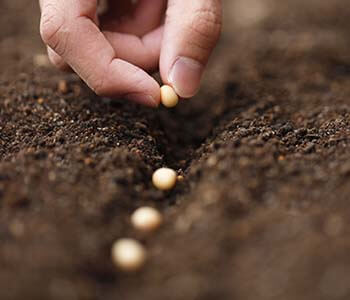Spring Tips - Planter Calibration
Apr 20, 2020

Planting season is upon us. In fact, some of you may have already started putting some seed in the ground. Hopefully you all had a chance to look over some of the most important aspects of your planter. In case you haven't, we have put together a quick checklist of things to look over before planting or periodically though the planting season.
As you know, planting is the most important operation on the farm. Our maximum yield potential is the day we put the seed in the ground and we only lose bushels from there.
Don't forget to always check soil conditions. Many people are more concerned about the date they start planting instead of the planting conditions. Corn is very sensitive to cold soils. It is very important to make sure soil temperature is 50*. When we are trying to push these cold temps, it can be very beneficial to add seed treatments to the early planting to help protect against seedling disease.
Seed treatments, like Quad 1, have been tested in our area and results have proven great benefits on emergence and yield. Getting crops out of the ground quickly and evenly is crucial to crop performance. Quad 1 contains growth regulators that helps get the crop off to a quick start. The seed treatment also includes microbes to help make nutrients more available. This helps guarantee maximum uptake and ensure maximum yield potential.
When you’re in the field and ready to start planting, always check seed depth. Planter settings and down pressure may change by field, so a quick check can help avoid problems and ensure uniform seed depth. This is also a good time to double check seed spacing and singulation.
As always, the seed specialists and agronomists at Great Bend Co-op are always available to help with planter set up.
- Opener Discs - Make sure discs are not worn more than a half inch. If so, you may want to replace them.
- Inner Scrapers - Be sure your scrapers are not overly worn to keep your discs turning smoothly.
- Seed Discs - Be sure seed discs are not overly worn. Seed singulation is critical.
- Gauge Wheels - Make sure bearings in your gauge wheels turn freely and the rubber makes light contact with the disc openers.
- Planter Arms and Bushings - Be sure row units move up and down freely.
- Closing Wheels - Be sure closing wheels are centered on the row unit to allow closing of the seed trench and ensure good seed-to-soil contact.
- Planter Hitch Height - Commonly overlooked, be sure that the hitch runs parallel to the ground when the row units are down.
- Row Cleaners - Be sure that row cleaners are set at optimal position determined by soil residue. Row cleaners should clear the residue, not plow dirt.
- Fertilizer System - Be sure all tubes and orifices are clean. This would be a good time to do a flowmeter calibration. Also, make sure all tubes put out equal flow.
- Monitor/Guidance System - Make sure monitors are updated to the newest version of firmware.
As you know, planting is the most important operation on the farm. Our maximum yield potential is the day we put the seed in the ground and we only lose bushels from there.
Don't forget to always check soil conditions. Many people are more concerned about the date they start planting instead of the planting conditions. Corn is very sensitive to cold soils. It is very important to make sure soil temperature is 50*. When we are trying to push these cold temps, it can be very beneficial to add seed treatments to the early planting to help protect against seedling disease.
Seed treatments, like Quad 1, have been tested in our area and results have proven great benefits on emergence and yield. Getting crops out of the ground quickly and evenly is crucial to crop performance. Quad 1 contains growth regulators that helps get the crop off to a quick start. The seed treatment also includes microbes to help make nutrients more available. This helps guarantee maximum uptake and ensure maximum yield potential.
When you’re in the field and ready to start planting, always check seed depth. Planter settings and down pressure may change by field, so a quick check can help avoid problems and ensure uniform seed depth. This is also a good time to double check seed spacing and singulation.
As always, the seed specialists and agronomists at Great Bend Co-op are always available to help with planter set up.